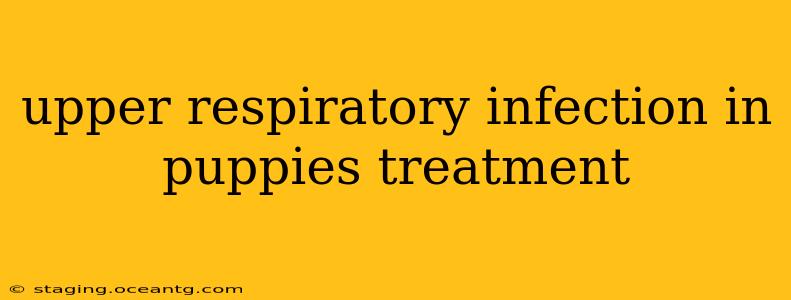Upper respiratory infections (URIs) are common in puppies, causing sneezing, coughing, and other distressing symptoms. While many URIs are mild and resolve on their own, prompt veterinary care is crucial to prevent complications and ensure your puppy's health. This comprehensive guide explores the treatment and prevention of URIs in puppies, addressing common questions and concerns.
What is an Upper Respiratory Infection (URI) in Puppies?
An upper respiratory infection in puppies is an inflammation of the upper respiratory tract, encompassing the nose, throat, and trachea. Various viruses and bacteria can cause URIs, often leading to a combination of symptoms. The young immune systems of puppies make them particularly vulnerable to these infections. Understanding the causes and recognizing the symptoms are the first steps towards effective management.
What are the Symptoms of a URI in Puppies?
Recognizing the symptoms of a URI in your puppy is crucial for early intervention. Common signs include:
- Sneezing: Frequent and sometimes forceful sneezing.
- Coughing: A dry, hacking cough, potentially worsening at night.
- Runny nose: Clear, white, or yellowish nasal discharge.
- Eye discharge: Watery or mucus-filled eye discharge.
- Lethargy: A noticeable decrease in energy levels and playfulness.
- Loss of appetite: Reduced interest in food and water intake.
- Fever: Elevated body temperature (though not always present).
- Difficulty breathing: In severe cases, labored breathing or increased respiratory rate.
How is a URI in Puppies Diagnosed?
Veterinary diagnosis is essential to determine the specific cause of your puppy's URI and rule out other potential conditions. Your veterinarian will likely conduct a physical examination, focusing on the respiratory system and listening to the puppy's lungs. While specific viral identification tests aren't always routine for URIs, they may be considered in severe cases.
What is the Treatment for a URI in Puppies?
Treatment for a puppy's URI depends on the severity and underlying cause. Mild cases often resolve with supportive care, while more severe infections might require medication. Common treatments include:
- Supportive care: This includes providing a warm, comfortable environment, ensuring adequate hydration (often through subcutaneous fluids at the vet's office), and offering a bland diet to encourage eating.
- Antibiotics: Antibiotics are generally only used if a bacterial infection is suspected or if the URI is severe and complicated by secondary bacterial infections. They are ineffective against viral infections.
- Antivirals: These are less commonly used for typical URIs in puppies, but may be considered in specific cases or outbreaks of highly contagious viruses.
- Cough suppressants: Cough suppressants might be prescribed to help reduce coughing if it is severe and interfering with the puppy's rest and well-being. However, it's crucial to discuss this with your vet first as suppressing a cough can sometimes hinder the body's natural clearing mechanisms.
How Long Does a URI Last in Puppies?
The duration of a URI in puppies varies considerably depending on the severity of the infection and the puppy's overall health. Mild infections might resolve within a week or two, while more severe cases can last longer, potentially requiring several weeks of treatment and monitoring.
What are the Potential Complications of Untreated URI in Puppies?
Untreated or poorly managed URIs in puppies can lead to several complications, including:
- Pneumonia: A severe lung infection can arise as a complication of a URI, particularly if the infection spreads to the lower respiratory tract.
- Secondary bacterial infections: A viral URI can weaken the puppy's immune system, making them more susceptible to secondary bacterial infections.
- Dehydration: Loss of appetite and increased respiratory effort can lead to dehydration, a serious condition requiring immediate veterinary attention.
How Can I Prevent Upper Respiratory Infections in My Puppy?
Preventing URIs in your puppy is crucial. Here are some key preventive measures:
- Vaccination: Core puppy vaccines offer protection against common viral infections that can contribute to URIs.
- Hygiene: Maintaining good hygiene is essential. Regularly clean and disinfect surfaces in your home, especially those your puppy comes into contact with.
- Isolation: Avoid contact with sick animals. If your puppy has a URI, isolate them from other pets to prevent the spread of infection.
- Proper nutrition: A balanced diet supports a strong immune system, making your puppy less susceptible to illness.
- Stress reduction: Minimize stress factors as stress can weaken the immune system.
When Should I Take My Puppy to the Vet?
If your puppy exhibits any symptoms of a URI, especially if they are worsening, consult your veterinarian promptly. Immediate veterinary attention is particularly important if your puppy shows signs of dehydration, difficulty breathing, or lethargy. Early intervention can prevent complications and ensure the best possible outcome for your furry friend.
Disclaimer: This information is for educational purposes only and should not be considered veterinary advice. Always consult with a qualified veterinarian for diagnosis and treatment of your puppy's health concerns.
